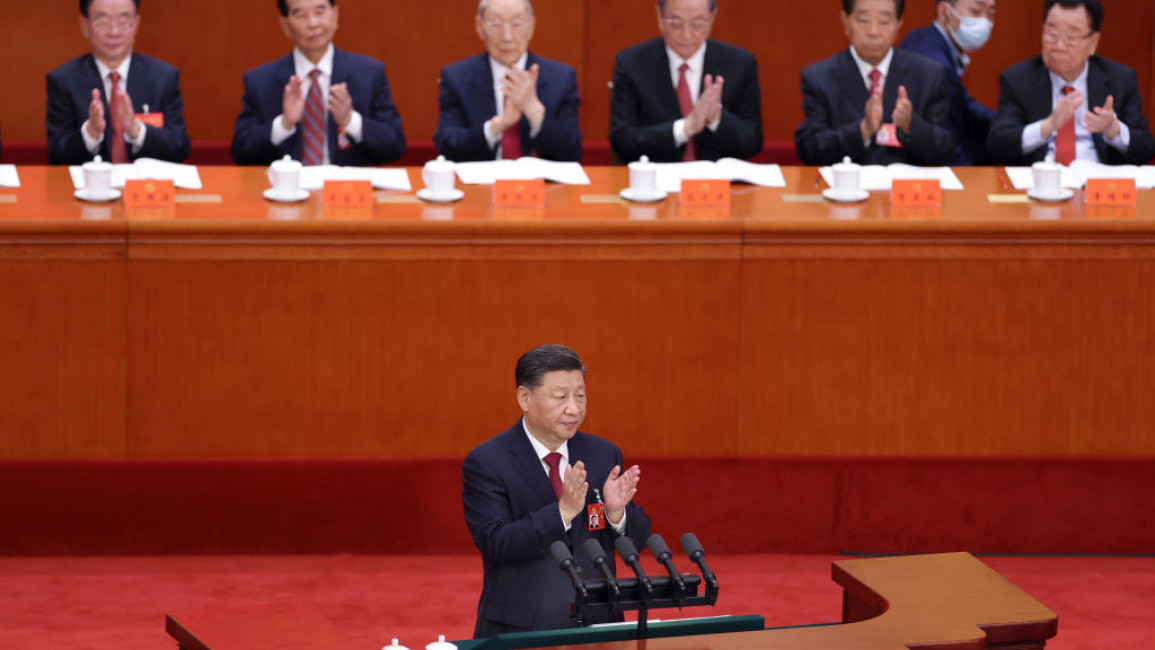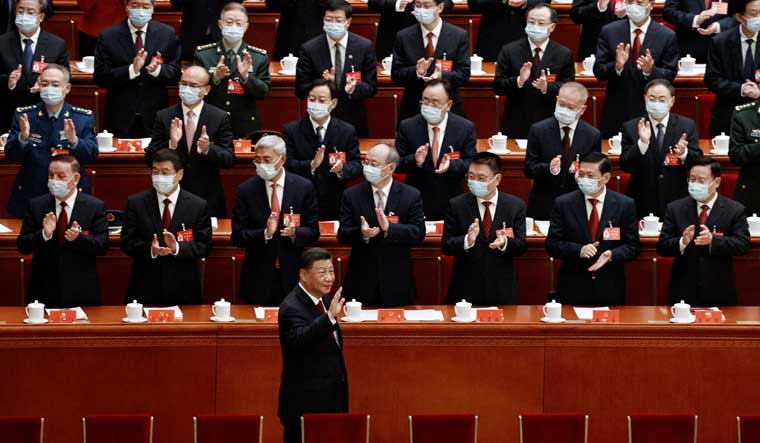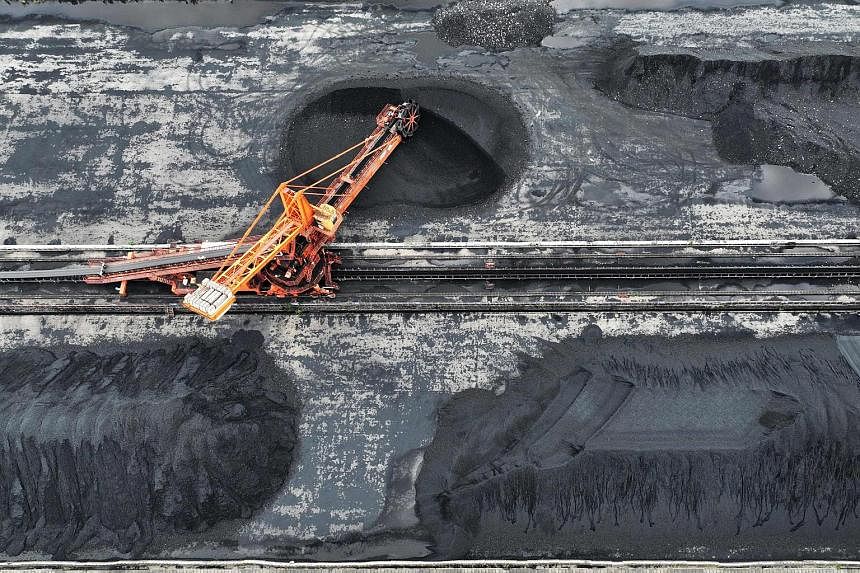President Xi Jinping hailed China's rise as a global power and demanded unity around his leadership on Sunday, launching a Communist Party Congress that is set to rubber-stamp his bid to rule for a historic third term.
The New Arab Staff & Agencies
16 October, 2022

'The 20th National Congress of the Communist Party of China is a very important congress convened at a critical moment,' Xi said [source: Getty]
Rapturous applause greeted Chinese President Xi Jinping as he took the stage on Sunday at the start of a carefully choreographed Communist Party Congress expected to confirm him as the country's most powerful leader since Mao Zedong.
Around 2,300 delegates gathered in Beijing's imposing Great Hall of the People, bedecked in the party's signature red and gold with banners bearing slogans hailing the "great, glorious and correct Chinese Communist Party".
Xi's opening speech came after a minute's silence for deceased party heroes, such as Mao and his successor Deng Xiaoping, and a live military band's rendition of the national anthem.
Beneath a giant hammer-and-sickle emblem, he spoke for around an hour and a half, presenting his scorecard of the government's work under his tenure and setting out his vision for his precedent-breaking third term.
RELATED UN body rejects debate on China's human rights record
Attendees diligently scribbled notes, with the occasional flash of colour from those in military attire or the traditional dress of one of China's ethnic minority groups punctuating a sea of monochrome suits.
Among more unusual delegates were the first Chinese woman to spacewalk, astronaut Wang Yaping, and Olympic hero speed skater Wu Dajing, wearing his national tracksuit.
In line with strict health protocols, all those attending were masked, apart from the front row of top-ranked guests.
These included Xi's predecessor Hu Jintao, grey-haired and looking frail, though Hu's predecessor Jiang Zemin did not appear to be in attendance.
Also present was Zhang Gaoli, a former vice premier accused by tennis star Peng Shuai of "forcing" her into sex, before she retracted her allegations after disappearing from public view for three weeks.
The Congress is a display of party unity and strength, with carefully vetted delegates drawn from all of China's provinces.
It is also a show of loyalty to Xi personally, with the 69-year-old expected to secure a third term as Communist Party general secretary, throwing out leader succession norms that have prevailed since the 1990s.
Guangxi delegate He Xiangyin told AFP she fully supported that move.
"As long as he (works) for the happiness of the people, and continues to improve our quality of life, we will all support him," she said. "He's the core of what we do."
Asked whether there were worries that there would be no one suitable to take over after Xi, Jiangsu delegate Li Yinjiang was dismissive.
"Our party will surely train someone properly for the role. Each generation passes the torch to the next," he said.
During the speech, thunderous clapping greeted Xi's mention of perceived successes, ranging from stamping out Covid-19 outbreaks to quelling unrest in Hong Kong.
The longest and loudest applause came for his comments on Taiwan, as he stated: "Reunification of the motherland must be achieved and will be achieved."
Xi made no direct mention of the northwestern region of Xinjiang, where Western countries have accused China of widespread human rights abuses against the country's Muslim minorities, primarily the Uyghurs.
"We in Xinjiang live such happy lives, because our great party is leading us... As a Uyghur person, I am extremely thankful that I can live here in China," Rehema Awuqi, from the party's Xinjiang delegation, told AFP after the speech.
In the week leading up to the event, Beijing has been spruced up with banners, exhibitions and flower arrangements extolling the party's virtues and Xi's political philosophy, and urging onlookers to "delightedly welcome" the Congress.
A heavy security presence was in place in the capital, with police standing sentry at major intersections and an increased number of personnel deployed on pedestrian bridges around the city.
The mostly closed-door conclave is taking place under China's strict zero-Covid policy, with journalists and other attendees holed up from Friday in a virus-secure bubble with mandatory mask-wearing and daily PCR tests.
'Will never renounce the right to use force on Taiwan,' says Xi at 20th CCP congress
He added that China will accelerate the building of a world-class military
Web Desk Updated: October 16, 2022

Chinese President Xi Jinping waves as he arrives for the opening ceremony of the 20th National Congress of the Communist Party of China, at the Great Hall of the People in Beijing, China on Sunday | Reuters
Chinese President Xi Jinping has opened the 20th National Congress of the Chinese Communist Party (CCP), an event which will see him cement his grip on the party and assume an unprecedented third term.
Xi, who walked onstage to thunderous applause, addressed a gathering of over 2,300 delegates from around the country at the vast Great Hall of the People on the west side of Tiananmen Square in Beijing.
During the opening of the once-in-five-year Congress, the Chinese President broached the topic of Hong Kong, claiming China has achieved comprehensive control over Hong Kong, turning it from chaos to governance. "China has also waged a major struggle against Taiwan separatism and is determined and able to oppose territorial integrity," Xi was quoted by Reuters. He added that China must ensure Hong Kong is ruled by patriots and that the country will support Hong Kong in integrating with the mainland. "One country, two systems' is the best system for Hong Kong and must be adhered to in the long run," he added.
The President said China will accelerate the building of world-class military and strengthen its ability to build a strategic deterrent capability. Xi is often credited for modernising China's People's Liberation Army (PLA) and moulding it into a world power.
On the Taiwan issue, the President said it is up to the Chinese people to resolve the Taiwan issue and China will never renounce the right to use force. Taiwan later responded to this remark saying it will not back down on its sovereignty or compromise on freedom and democracy.
Xi also touted the ruling Communist Party's fight against COVID-19, stating that the country's policies were aimed at the safety of the people. Xi's zero-Covid policy had come under the scanner for placing heavy curbs on people's lives. The president added that China had "protected people's safety and health to the highest degree and achieved significant positive results in coordinating epidemic prevention and control".
Suggesting that China will give priority to protecting the environment and promoting green consumption, production and lifestyles, Xi said the protection of nature was essential to building a modern socialist country. He added that China had made progress in tackling environmental problems and vowed to "basically eliminate" heavy air and water pollution while bringing soil contamination under control. He vowed to continue an "energy revolution" and promote the clean use of coal.
The president also said that Beijing opposed a "Cold War mentality" in international diplomacy. "China resolutely opposes all forms of hegemony and power politics, opposes the Cold War mentality, opposes interfering in other countries domestic politics, opposes double standards," he said.
Chinese President Xi Jinping has opened the 20th National Congress of the Chinese Communist Party (CCP), an event which will see him cement his grip on the party and assume an unprecedented third term.
Xi, who walked onstage to thunderous applause, addressed a gathering of over 2,300 delegates from around the country at the vast Great Hall of the People on the west side of Tiananmen Square in Beijing.
During the opening of the once-in-five-year Congress, the Chinese President broached the topic of Hong Kong, claiming China has achieved comprehensive control over Hong Kong, turning it from chaos to governance. "China has also waged a major struggle against Taiwan separatism and is determined and able to oppose territorial integrity," Xi was quoted by Reuters. He added that China must ensure Hong Kong is ruled by patriots and that the country will support Hong Kong in integrating with the mainland. "One country, two systems' is the best system for Hong Kong and must be adhered to in the long run," he added.
The President said China will accelerate the building of world-class military and strengthen its ability to build a strategic deterrent capability. Xi is often credited for modernising China's People's Liberation Army (PLA) and moulding it into a world power.
On the Taiwan issue, the President said it is up to the Chinese people to resolve the Taiwan issue and China will never renounce the right to use force. Taiwan later responded to this remark saying it will not back down on its sovereignty or compromise on freedom and democracy.
Xi also touted the ruling Communist Party's fight against COVID-19, stating that the country's policies were aimed at the safety of the people. Xi's zero-Covid policy had come under the scanner for placing heavy curbs on people's lives. The president added that China had "protected people's safety and health to the highest degree and achieved significant positive results in coordinating epidemic prevention and control".
Suggesting that China will give priority to protecting the environment and promoting green consumption, production and lifestyles, Xi said the protection of nature was essential to building a modern socialist country. He added that China had made progress in tackling environmental problems and vowed to "basically eliminate" heavy air and water pollution while bringing soil contamination under control. He vowed to continue an "energy revolution" and promote the clean use of coal.
The president also said that Beijing opposed a "Cold War mentality" in international diplomacy. "China resolutely opposes all forms of hegemony and power politics, opposes the Cold War mentality, opposes interfering in other countries domestic politics, opposes double standards," he said.
China's Party Congress: Beijing won't rush clean energy transformation, says Xi


China's path to decarbonisation is clear: It will not stop burning fossil fuels until it is confident that clean energy can reliably replace them. PHOTO: AFP
BEIJING - President Xi Jinping has promised a slow and steady end to the growth of planet-warming emissions in China, with energy security taking top priority as the country contends with a flagging economy and tumult on global fuel markets.
In a two-hour speech to kick off the week-long Communist Party Congress, Xi said that prudence would govern China's efforts to peak and eventually zero-out carbon emissions. The cautious wording comes after a spate of high-profile power shortages in recent years, and as global energy costs have soared after Russia's invasion of Ukraine upended trade flows.
The speech made China's path to decarbonisation clear: It will not stop burning fossil fuels until it is confident that clean energy can reliably replace them.
"We will work actively and prudently toward the goals of reaching peak carbon emissions and carbon neutrality," Xi said in his address. "Based on China's energy and resource endowments, we will advance initiatives to reach peak carbon emissions in a well-planned and phased way, in line with the principle of getting the new before discarding the old."
China is the world's largest emitter of greenhouse gases, and Xi electrified climate activists two years ago when he vowed to reach carbon neutrality by 2060 after peaking emissions before 2030. The announcement sparked a massive surge in investment in clean energy by local governments and state-owned firms.
But last year, focus began to return to China's mainstay fuel of coal after a shortage triggered widespread power curtailments to factories, slowing economic growth. The country vowed to increase mining capacity, and production has risen to record levels this year, keeping storage sites well stocked and reducing imports.
China will also expand exploration and development of oil and gas resources, and increase reserves and production as part of the measures to ensure energy security, according to a congress work report released after Xi's speech.
China invests more than any other country in clean energy, and is on pace to shatter its record for new solar installations this year. But it hasn't been able to outrun the growth in energy demand, forcing it to burn more coal and setting a record for consumption last year that is likely to be eclipsed in 2022.
Xi made clear that fossil fuels and renewables will have to work in tandem.
"Coal will be used in a cleaner and more efficient way and we will speed up the planning and development of new energy systems," he said.
He also vowed that China would be actively involved in the global response to climate change. His government was criticised after it broke off climate negotiations with the United States in August after House Speaker Nancy Pelosi's visit to the contested island of Taiwan. BLOOMBERG
MORE ON THIS TOPIC
BEIJING - President Xi Jinping has promised a slow and steady end to the growth of planet-warming emissions in China, with energy security taking top priority as the country contends with a flagging economy and tumult on global fuel markets.
In a two-hour speech to kick off the week-long Communist Party Congress, Xi said that prudence would govern China's efforts to peak and eventually zero-out carbon emissions. The cautious wording comes after a spate of high-profile power shortages in recent years, and as global energy costs have soared after Russia's invasion of Ukraine upended trade flows.
The speech made China's path to decarbonisation clear: It will not stop burning fossil fuels until it is confident that clean energy can reliably replace them.
"We will work actively and prudently toward the goals of reaching peak carbon emissions and carbon neutrality," Xi said in his address. "Based on China's energy and resource endowments, we will advance initiatives to reach peak carbon emissions in a well-planned and phased way, in line with the principle of getting the new before discarding the old."
China is the world's largest emitter of greenhouse gases, and Xi electrified climate activists two years ago when he vowed to reach carbon neutrality by 2060 after peaking emissions before 2030. The announcement sparked a massive surge in investment in clean energy by local governments and state-owned firms.
But last year, focus began to return to China's mainstay fuel of coal after a shortage triggered widespread power curtailments to factories, slowing economic growth. The country vowed to increase mining capacity, and production has risen to record levels this year, keeping storage sites well stocked and reducing imports.
China will also expand exploration and development of oil and gas resources, and increase reserves and production as part of the measures to ensure energy security, according to a congress work report released after Xi's speech.
China invests more than any other country in clean energy, and is on pace to shatter its record for new solar installations this year. But it hasn't been able to outrun the growth in energy demand, forcing it to burn more coal and setting a record for consumption last year that is likely to be eclipsed in 2022.
Xi made clear that fossil fuels and renewables will have to work in tandem.
"Coal will be used in a cleaner and more efficient way and we will speed up the planning and development of new energy systems," he said.
He also vowed that China would be actively involved in the global response to climate change. His government was criticised after it broke off climate negotiations with the United States in August after House Speaker Nancy Pelosi's visit to the contested island of Taiwan. BLOOMBERG
No comments:
Post a Comment